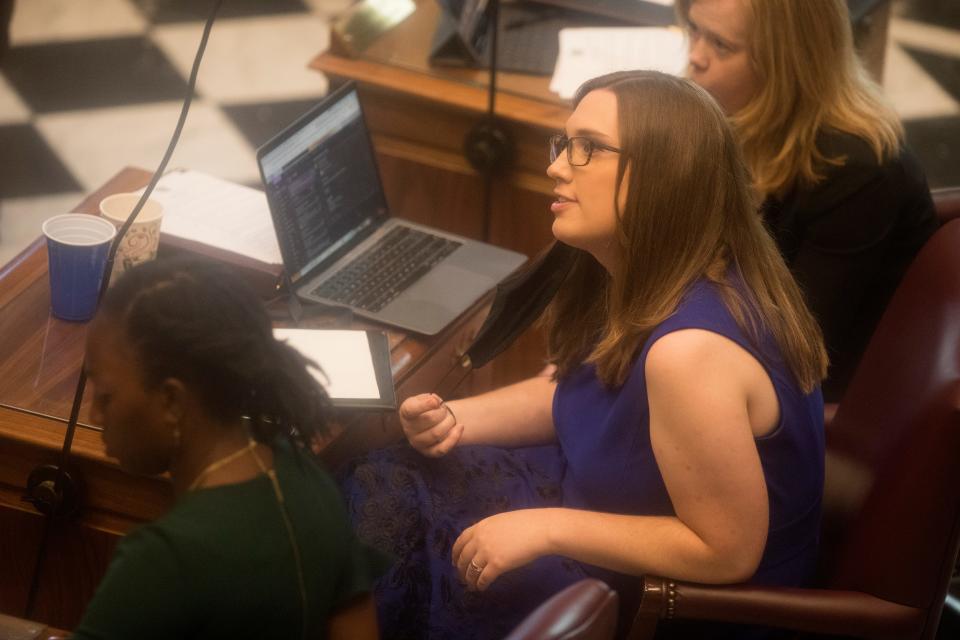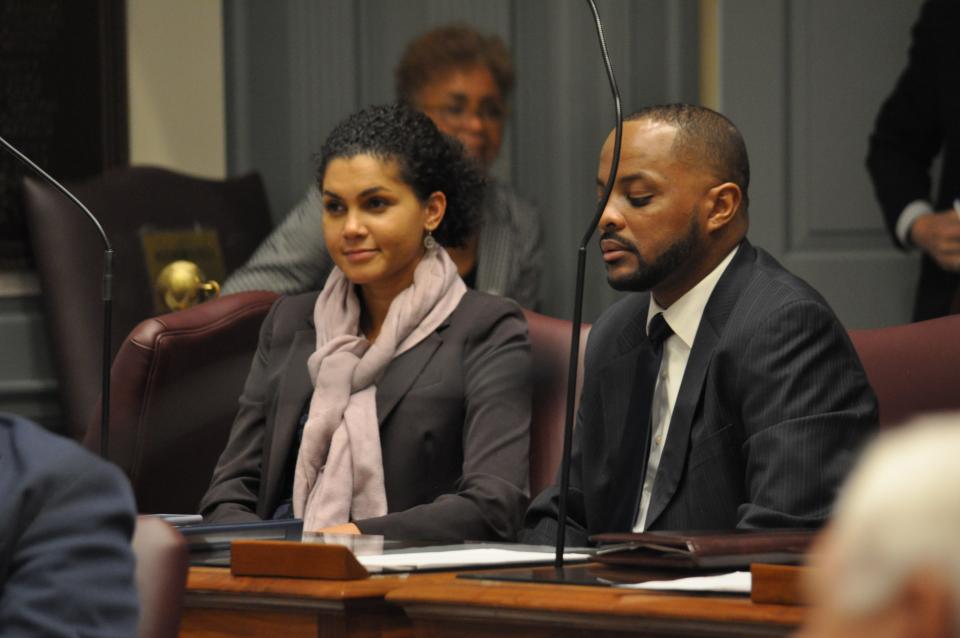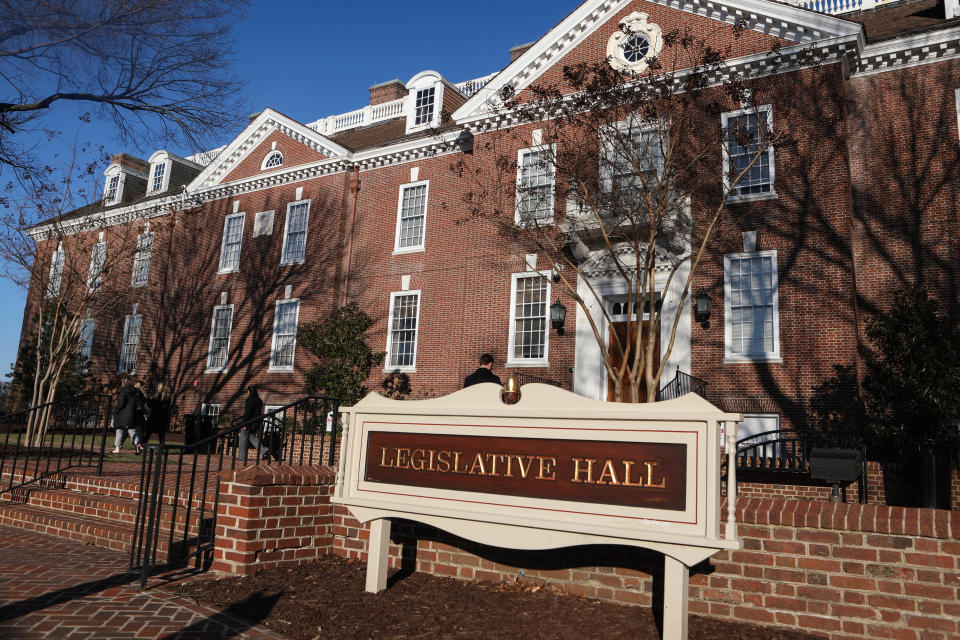More money, new problems: Here's what to expect from Delaware's 2022 legislative session
Delaware lawmakers returned from their six-month break on Jan. 11 to a slew of bills they failed to pass in 2021 such as legal marijuana and police transparency.
They also returned to a mound of new issues including how to spend an enormous projection of extra revenue, an internal ethics complaint against one of their own and the COVID-19 health care crisis.
This session could look different than others, not just because it will be mostly virtual until COVID-19 becomes less of a public health threat.
The Senate will conduct its first ethics inquiry in 35 years against Wilmington Democrat Sen. Darius Brown, who appears to have no plans to step down after facing multiple criminal and internal allegations related to his treatment of women. He was recently found not guilty of the criminal charges.
Lawmakers may also step in to respond to the overwhelming cases of the omicron variant, which has flooded hospitals to crisis levels.
Delaware's legislative session runs two years, and any bills that didn't pass in 2021 rolledover in 2022. Lawmakers' deadline to pass bills is June 30.
Democrats control both chambers, as well as the governor's office and all other state agencies. And after seizing two new Senate seats in the 2020 election, the Democratic Party has perhaps never had an easier time passing their agenda in recent history.
Republicans, on the other hand, struggled last year to pass any of their wants including doubling down on voter fraud and limiting the governor's emergency powers. They're pivoting this year to a new agenda including tech upgrades for schools, tax breaks and hiring incentives for emergency services, including police departments, according to House Minority Leader Danny Short of Seaford.
Gov. John Carney's priorities will look a lot like they have in past years: conservative spending and putting any extra revenue into one-time projects.
"We look forward to building on historic investments in public education and our economy to expand opportunity for all Delawareans," said Carney's spokesman Jon Starkey. "That will include ... investments in road and bridge repairs, clean water projects, school construction, broadband expansion, farmland preservation and more."
REFRESHER: Here's what Delaware legislators accomplished in 2021, and what was left undone
Big revenue forecast

The General Assembly is looking at a whopping $824 million in projected extra revenue for next year's spending plan.
To put that in perspective: Before the pandemic at the start of 2020, lawmakers were elated over a projected extra $200 million, and for a brief time before the virus-induced economic crisis their biggest worries were how to best spend it.
With more than four times that much projected now, Republicans, moderate Democrats and progressive Democrats can expect to brawl over how to spend the money.
Typically, that fight ends in Gov. John Carney getting his way with a conservative spending plan that allocates most money either into a savings account or toward one-time spending such as construction.
Even with the gargantuan revenue projection, any new government programs that have been on the wishlist of progressive Democrats will have a hard time getting Carney's approval because they would mean recurring expenses.
Finance Secretary Rick Geisenberger said the $824 million is due to the realty transfer tax and the corporate income tax. It's likely because people are moving out of densely populated areas to more suburban rural areas, and corporate profits have been particularly strong among large companies who are subject to the income tax, he said.
He also stressed that, because those revenue streams are volatile, lawmakers shouldn't get comfortable with expecting so much money every year.
"We should be careful," Geisenberger said.
Carney won't release his official spending plan until later this month.
Increasing staff for COVID-19 crisis
Lawmakers could pass legislation to help hospitals facing a staffing shortage in the midst of the COVID-19 pandemic, according to Senate President Pro Tempore Sokola.
Gov. John Carney's latest emergency order enabled Delaware National Guard members to work as certified nursing assistants to care for patients currently in Delaware hospitals, which lawmakers plan to codify this month to make it permanent, Sokola said.
Lawmakers could also go a step further to make it easier for other people, such as formally credentialed health professionals, to also become certified nursing assistants at the Department of Health and Social Service's discretion.
"There may be ways that we can streamline getting people back into an area, even if they're interested in putting in one shift a week," he said. "We've got to try to help people."
HOSPITALS IMPLEMENT EMERGENCY RULES: ChristianaCare, other hospitals implement emergency rules to handle COVID-19 surge
Paid family leave

Lawmakers are expected to pass a bill this session that would create a statewide paid family and medical leave insurance program.
Sen. Sarah McBride, the Wilmington Democrat sponsoring the bill, plans to introduce a new version of the bill this year that will include amendments based on feedback from stakeholders, including from the business world.
Leadership has promised to get the bill passed this year and that it's a "top priority," and other state officials such as Lt. Gov. Bethany Hall-Long back the bill, McBride said.
The original bill ensured Delaware workers can get up to 12 weeks of paid family and medical leave. Amendments will include changes to eligibility and parameters of leave, among other changes, McBride said.
Legal marijuana

Democrats are under pressure to legalize marijuana after failing to pass an ambitious bill in 2021 that would follow the examples of nearby states such as New Jersey that have recently sanctioned the plant.
Last year, the bill was postponed from a vote after the Democratic sponsor, Newark Rep. Ed Osienski, found out the loan program written into the bill for hopeful business owners who have been victim to marijuana criminalization required 75% of lawmakers' approval instead of 60% as they initially thought. For such a controversial bill, that threshold is virtually impossible.
Osienski's solution was to erase the loan program from the bill and find some other avenue for financial aid, but that led to several Black lawmakers threatening to pull support. Other lawmakers had also tacked on several amendments at the final hour, confusing many other members who said they didn't have enough time to read through all the changes before last year's deadline.
Now, Osienski says he's heavily amended the bill that he plans to file later this week. It will strike out the loan program, but Osienski said he plans to replace it with other financial aid programs that would accomplish the same social equity goal while also keeping the vote threshold at 60%.
"We've put even more energy into it to try to address some of my colleagues' concerns from last year, so I'm feeling very positive about it," Osienski said.
REFRESHER: Why Delaware Democrats failed to legalize marijuana in 2021
Police transparency faces hurdles, amendments
Lawmakers will consider a highly controversial bill to reform the Law Enforcement Officers' Bill of Rights, a section of state law that says how police can discipline its officers and how much the public is allowed to know about it.
Democrats introduced the bill last spring despite inconsistent recommendations from a task force they created to decide whether the bill and other policies are warranted.
Senate Majority Whip Tizzy Lockman, a Wilmington Democrat who is sponsoring the bill, said to expect a substitute version of the bill after talks with police and other stakeholders who pushed back on the original version.
"We're not in a position yet to discuss details on what that might look like exactly, or the strategy moving forward," Lockman said.
Ethics probe into Sen. Darius Brown persists

The Senate will handle its first ethics inquiry in 35 years into Sen. Darius Brown, the Wilmington Democrat who was removed from two committees last year after being arrested for allegedly punching a woman and throwing a glass of water at a Talleyville restaurant in the spring and, months later, accused of getting into a heated verbal altercation with a female lawmaker at a press event.
A jury acquitted Brown of criminal charges last week, but the ethics inquiry will persist despite threats from the Delaware NAACP to sue and call on the federal government to challenge it. It's unclear how the group would succeed in legal action. Brown is the only Black man in the Senate and is up for reelection this fall.
NAACP THREATENS LEGAL ACTION: NAACP demands end to punishments of Sen. Darius Brown, threatens to sue over ethics probe
No indication lawmakers will try to remove Kathy McGuiness

At the same time, there's no indication that lawmakers will try again to remove Auditor Kathy McGuiness from office after the indicted official refused to step down last fall in the face of two felony charges and three public-corruption misdemeanor charges.
According to the state constitution, two-thirds of the General Assembly can agree to petition the governor to remove an official for "any reasonable cause." A handful of lawmakers tried to wield this power against McGuiness during a special redistricting session last fall but failed because they didn't have enough votes.
Gun control still on the table

After failing to pass gun bills in recent years due to grassroots pushback, Senate Democrats are pushing again to require training and a permit to buy a handgun and limit certain types of magazines. Now, they're facing hurdles in the House.
Senate President Pro Tempore David Sokola, a Newark Democrat who sponsored last year's bill to ban magazines that can hold more than 17 rounds of ammo and require owners to surrender them to the state, said he is still working on finding common ground after the House aggressively amended it.
The House amendment essentially guts the entire bill, allowing buying and owning magazines that are commonly included as accessories with new firearms.
The higher priority appears to be the permit-to-purchase bill, which is sponsored by Sen. Tizzy Lockman, a Wilmington Democrat. That bill passed the Senate last year but stalled in the House, and it's unclear if an agreement will be reached.
Rep. Sherry Dorsey Walker, a Wilmington Democrat, in June introduced an amendment to the bill that would exempt police from the training requirement, among other changes. Lockman said the amendment is a "friendly one."
MOSTLY VIRTUAL SESSION: Delaware General Assembly to stay mostly virtual in the face of omicron variant for winter
What else?

Lawmakers also plan to pass a bill by House Speaker Pete Schwartzkopf, a Rehoboth Beach Democrat, to make drive-through and take-out alcohol sales permanently available through eligible businesses. The state has temporarily allowed the practice during the COVID-19 pandemic.
Lawmakers could also try again to pass a bill to allow no-excuse absentee voting ahead of the 2022 midterms. The bill by Rep. David Bentz, a Christiana Democrat, had support last year from leadership in both chambers, but House Republicans blocked it citing fears of voter fraud.
It's unclear where the bill stands now. Bentz did not respond to inquiries from Delaware Online/The News Journal.
They could also pass a bill by Sen. Bryan Townsend, a Newark Democrat, to give the right to free legal counsel to low-income people facing eviction.
Another housing bill by Sen. Tizzy Lockman would create a "mitigation fund" to help landlords who incur expenses when accepting tenants supported by government rental assistance.
And a bill by Rep. Ed Osienski, a Newark Democrat, would exempt 2021 unemployment benefits from state income tax. Lawmakers passed a similar bill last year.
FIRST SENATE ETHICS INQUIRY IN 35 YEARS: Sen. Darius Brown faces the first Senate ethics investigation in 35 years. What to expect
WATER INFRASTRUCTURE WOES: 'We don't use it': Why Delaware's rural residents are facing water infrastructure woes
Sarah Gamard covers government and politics for Delaware Online/The News Journal. Reach her at (302) 324-2281 or sgamard@delawareonline.com. Follow her on Twitter @SarahGamard.
This article originally appeared on Delaware News Journal: Here's what to expect from Delaware's 2022 legislative session

